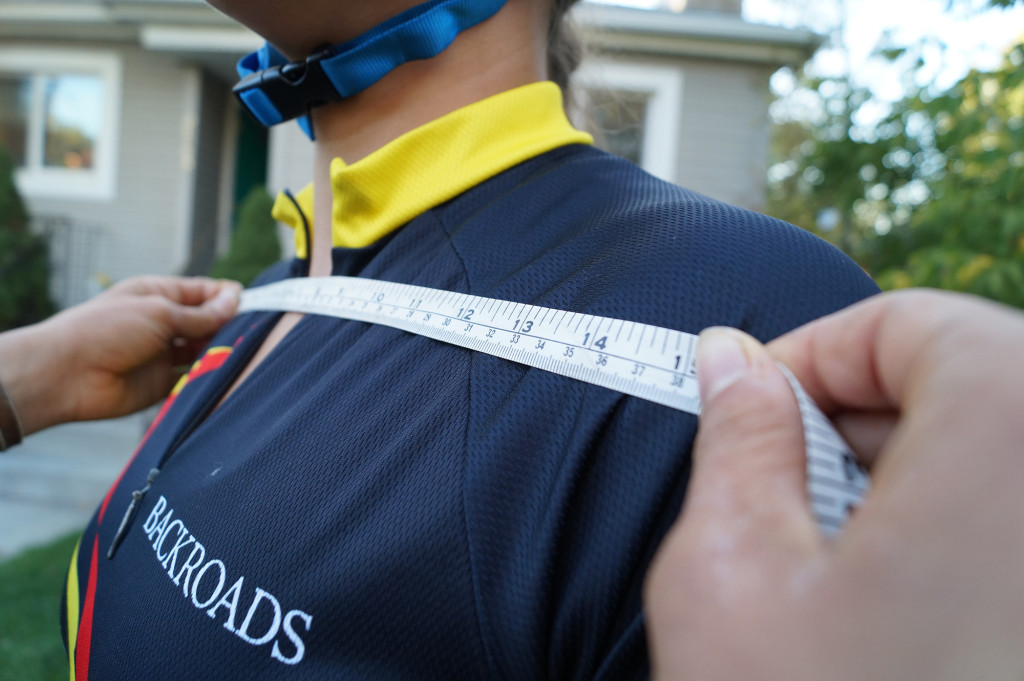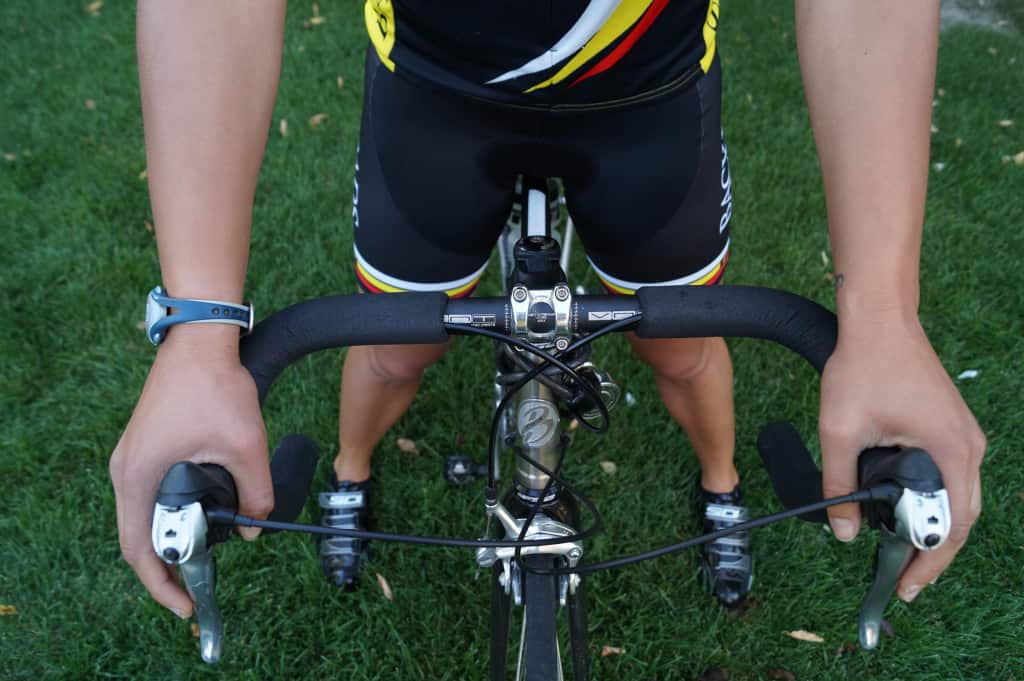Choosing the correct bike handlebars can mean the difference between being one with your bike and feeling as if you’re wrestling a horned animal. When choosing what type of handlebar is right for you, there are three primary considerations: width, application and material. You will also need to keep in mind compatibility with your bike frame, which your local bicycle dealer can help you determine.

- Finding the Correct Width
- Why You’d Want Flat or Drop Bars
- Common Materials for Bike Handlebars
- Parting Words
Before making any decision regarding handlebars, make sure you have achieved the correct saddle height, as well as the proper fore and aft adjustment for your body. Once these adjustments are made, you can properly judge which handlebars will be suitable for you.
While there are styles of handlebars that are specialized for specific types of riding, this article will focus on the two most common types: flat bars and drop bars. The vast majority of bikes will have one of these two styles. Here is a quick introduction to these styles and their typical applications:
Flat Bars
The most basic of all handlebars, they are linearly shaped and are used mostly for mountain bikes, casual road riding and hybrid bikes. While only allowing for one standard body and hand position, this style is often more comfortable for those who prefer to sit more upright.
Drop Bars
Used by cyclists of both the road and cyclocross disciplines; they have a curving shape like that of ram horns. This style allows for the rider to be in a more stretched-out and aggressive body position, as well as allows for multiple hand positions that enhance comfort over long distances.
Finding the Correct Width
No matter what your discipline of riding - whether road, mountain or hybrid - choosing the correct width for your new handlebar starts with a shoulder-to-shoulder width measurement. (In order to ensure an accurate reading, have a friend help you.)
Stand upright and relax your shoulders. Starting at the boney protrusion of one of your shoulders, have your partner use a metric measuring tape to measure across your chest to the bony protrusion of the opposite shoulder.
Backroads Pro Tip
Perform this shoulder-to-shoulder measurement multiple times to ensure the dimension is accurate.
Record your finding when you’re finished. This width will be the starting point for choosing the correct handlebar size for your bicycle.
Why You’d Want Flat or Drop Bars
Drop / Road Bars
Most drop bars are designed with a gradual downward curvature to allow the rider to attain various hand positions. This includes a lower grip, which reduces the body’s profile and helps the rider become more aerodynamic. These multiple hand and body configuration options are suited for longer distance riding when being able to shift your body around provides a greater degree of comfort.
If you are selecting a set of drop bars for a road bike, take your shoulder-to-shoulder measurement and add 2 centimeters. For example, the ideal drop handlebar width for a rider with a shoulder width of 38 centimeters would be 40 centimeters. This additional width is to account for the natural radiating direction of a cyclist’s arms. The measurement for handlebar width is taken from the center of one bar end across to the center of the other. However, not all bars are measured in this manner, so check with the manufacturer’s measurement method to determine if a particular set of bike handlebars is the correct width for you. Keep in mind that it is rare to find bars over 46cm.
Upright / Flat Bars
Upright handlebars, the ones traditionally found on mountain or city bikes, allow for a greater degree of stability and a more upright seated position, which is preferable for most beginner or short-distance riders. While most upright bars you will be limited to just one placement option for your hands, this isn’t a concern when not spending long hours in the saddle. When choosing upright handlebars, a good rule of thumb is to start by adding 10–15 centimeters to your shoulder-to-shoulder measurement. Mountain bikers will go significantly wider than this in order to increase their leverage on the bars. This increases stability and control, over rougher terrain.
Backroads Pro Tip
When riding aggressively over rough terrain, a wider handlebar will be more beneficial. For instance, downhill mountain bike bars can be sold as wide as 82 centimeters.
Note: due to the simplistic, more linear design of such bars, the bars themselves can often be bought in oversize widths and cut down to a personal size.
A wider bar will naturally stretch your arms out wider, potentially leading you to extend your arms farther than you are comfortable with. Ideally, you should have a slight curvature in your arms so your muscles can be engaged properly. Locked arms are a sure sign of overextension!
If you prefer a wider grip but need to shorten the distance between you and the bars, it might be beneficial to choose a set with a slight sweep that arcs backward. Straight bars can also come with a small amount of rise as well. (This is when the handles shape upward.) This puts the rider in a more upright riding position, which shifts the rider’s weight toward the back wheel. A small amount of rise is typically preferred by downhill riders, as well as those who simply prefer a more erect back.
Common Materials for Bike Handlebars
Commercially available handlebars come in a variety of different materials, but the two primary options are carbon and aluminum. Both are viable options and each has its own strengths.
Aluminum is more popular than carbon, given its affordability and ability to be both lightweight and strong. Among discerning mountain bikers, aluminum is preferred because it is believed to be more resilient against impact. This sentiment is especially prevalent among aggressive mountain bikers as they are more prone to falls. Additionally, it is easier to judge the damage an aluminum component has sustained from a crash than it is to judge whether carbon material has been compromised.
Carbon handlebars are fairly popular among some of the racing disciplines, most notably with road cycling and XC mountain bike racing. In these styles, a lighter bike is beneficial to an athlete’s performance. Carbon, therefore, is a great option since it can be made lighter than aluminum. It can also be made stiffer, which helps a rider better transfer energy into forward momentum. Carbon can improve ride comfort as well. It is very effective at damping high-frequency vibration, which is common when riding on a poorly maintained city street. Carbon bars can help reduce some of this annoying “road chatter” that can be transferred into a cyclist’s arms.
Parting Words
When choosing a handlebar, keep your personal goals in mind, such as comfort, aerodynamics and weight. Make your goals known to your local bicycle dealer and they will walk you through some options to successfully meet those targets. Their expertise will also help determine whether certain options are compatible with your current stem. This will ensure a proper and safe installation. Lastly, many shops offer in-depth services to help adjust a bike to your body’s exact specifications. If you plan on putting a significant amount of miles, consider taking advantage of a full bike fitting. It will greatly improve your cycling experience and help you select a set of bars to meet your personal needs.
[Special thanks to Fishers Cyclery of Salt Lake City for the handlebar product photos]
[Special thanks to Lexi Evans and Leandra Bitterfeld for model photos]







